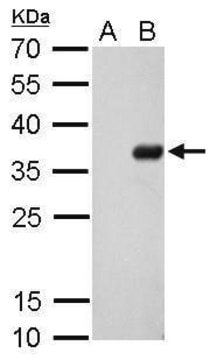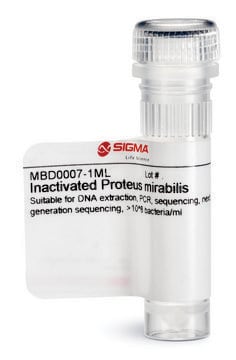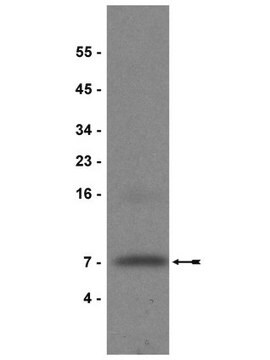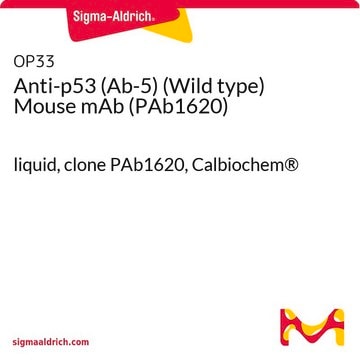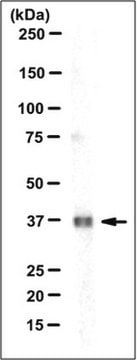推荐产品
生物源
rabbit
抗體表格
IgG fraction of antiserum
無性繁殖
polyclonal
描述
Research area: Microbiome
形狀
buffered aqueous solution
分子量
~70 kDa
物種活性
Proteus mirabilis
包裝
antibody small pack of 25 μL
濃度
~1 mg/mL
技術
immunoblotting: 1:10,000-1:20,000 using Proteus mirabilis LPS
indirect ELISA: 1:16,000-1:32,000
運輸包裝
dry ice
儲存溫度
−20°C
目標翻譯後修改
unmodified
相关类别
一般說明
Proteus mirabilis is a Gram negative rod-shaped bacteria, belongs to the Enterobacteriaceae family. Member of the Proteus genus (Proteus spp.) which also includes Proteus mirabilis, Proteus penneri and Proteus hauseri, originally characterize by their ability to swarm on solid surfaces, are widespread in the environment and the gastrointestinal tract of human and animals and known to be an opportunistic pathogens isolated from urine, wounds and other clinical sources. The Proteus spp. bacteria, are distinguished by their reactions for indole production, salicin fermentation and aesculin hydrolysis. P. vulgaris produces indole which differentiates it from the indole-negative P. mirabilis and P. penneri. Proteus spp. bacteria may also be found in soil or water habitats where they often regarded as indicators of fecal pollution and a contamination threat for potential water or seafood poisoning.
免疫原
Proteus mirabilis OXK dead bacteria, ATCC strain 15146
應用
Anti-Proteus mirabilis antibody recognizes P. mirabilis whole extract and P. mirabilis LPS, the antibody also recognizes an additional ~70kDa band suspected as bacterial HSP70 (DNAK) in whole extract P. vulgaris, P. gingivalis, E.coli K-12, P.aeruginosa, S. flexneri, S. enterica and E. faecalis but it has no cross reactivity with P. vulgaris LPS. The antibody may be used in various immunochemical techniques including Immunoblotting and ELISA.
外觀
Supplied as a solution in 0.01 M phosphate buffered saline pH 7.4, containing 15 mM sodium azide as a preservative.
其他說明
This product is for R&D use only, not for drug, household, or other uses.
免責聲明
This product is for R&D use only, not for drug, household, or other uses.
儲存類別代碼
10 - Combustible liquids
水污染物質分類(WGK)
WGK 1
閃點(°F)
Not applicable
閃點(°C)
Not applicable
ANTIMICROBIAL RESISTANCE PATTERNS OF PROTEUS ISOLATES FROM CLINICAL SPECIMENS
Bahashwan, et al.
EUROPEAN SCIENTIFIC JOURNAL, 9, 188-202 (2013)
C M O'Hara et al.
International journal of systematic and evolutionary microbiology, 50 Pt 5, 1869-1875 (2000-10-18)
Strains traditionally identified as Proteus vulgaris formed three biogroups. Biogroup 1, characterized by negative reactions for indole production, salicin fermentation and aesculin hydrolysis, is now known as Proteus penneri. Biogroup 2, characterized by positive reactions for indole, salicin and aesculin
Noriyuki Nagano et al.
Journal of clinical microbiology, 41(12), 5530-5536 (2003-12-10)
Nineteen multidrug-resistant Proteus mirabilis strains were isolated from 19 patients suffering from infections probably caused by P. mirabilis. These strains were recovered from urine or other urogenital specimens of 16 inpatients and three outpatients with a hospitalization history in a
Jessica N Schaffer et al.
Microbiology spectrum, 3(5) (2015-11-07)
Proteus mirabilis is a Gram-negative bacterium and is well known for its ability to robustly swarm across surfaces in a striking bulls'-eye pattern. Clinically, this organism is most frequently a pathogen of the urinary tract, particularly in patients undergoing long-term
N Pal et al.
Annals of medical and health sciences research, 6(5), 267-273 (2017-05-16)
Proteus species cause a variety of community- and hospital-acquired illnesses. Synthesis of β-lactamases is the predominant mechanism for resistance to β-lactam antibiotics. Among the β-lactamases, extended spectrum β-lactamases (ESBLs) and AmpC β-lactamases are the most common. The objective of this
我们的科学家团队拥有各种研究领域经验,包括生命科学、材料科学、化学合成、色谱、分析及许多其他领域.
联系技术服务部门
